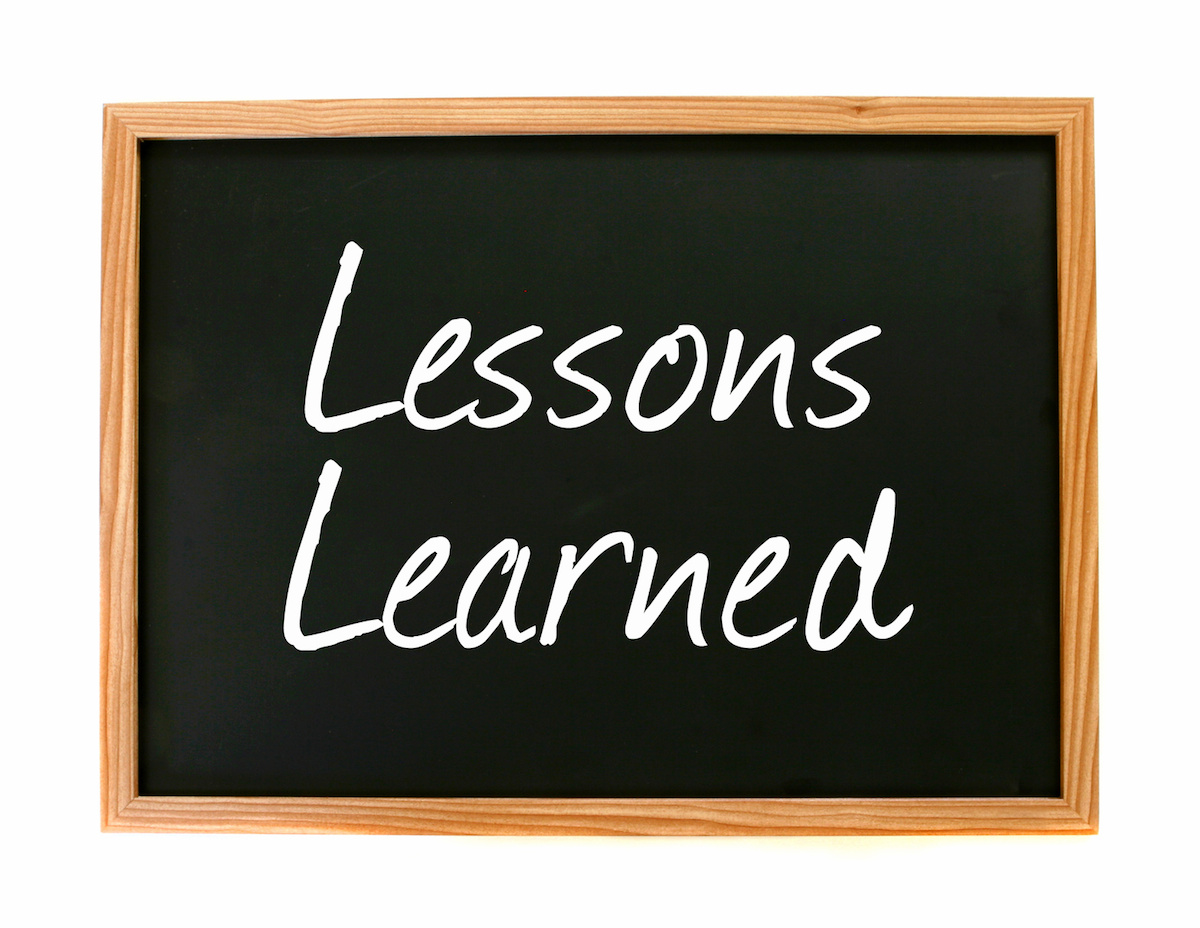With an Apple Event fast approaching, I’m reviewing critiques of past Apple Events to see how accurate they were. Turns out, not very. Critique is needed and welcome. Repeated errors? Not so much.
Business Models
No one gets more bad advice than does Apple. Apple went from near-bankruptcy to nearly the largest company on earth, all the while being told each step of the way that they were doing it wrong. And now that Apple has done the equivalent of winning ten Super Bowls in a row, have the critics relented? Of course not. Their advice to Apple, as always, is that the only way for them to remain successful is to do the exact opposite of what made them successful.
It’s hard to say who gets criticized the most, the successful person, or the failure but it’s mighty close. ~ Joe Moore
This final section of my Claim Chowder Series focuses on business models. Apple has done all right while employing their own, unique, business model. However, no matter how much success Apple has, the critics insist that Apple is doing it all wrong.

Closed
Apple has done all right while employing a vertical (closed) business model. The critics insist that Apple is doing it all wrong.
There’s something problematic in the idea that platforms with 1.5 billion users and 100 billion+ 3rd party apps installed are ‘closed’. ~ Benedict Evans (@BenedictEvans) April, 2014
…Apple’s ability to sustain an innovative edge over Android will be reduced to months – if that. The collective development opportunities made possible by the fact that Android is Open Source will see to that. ~ Brian Prentice, Gartner, 21 September 2009
Apple will have to make a strategic decision on whether to open up the platform. Ultimately a closed system just can’t go that far. ~ Patrick Lo, CEO, Netgear, 31 January 2011
It’s quite likely that Apple is going to commit the classic Apple mistake of trying to be too controlling and therefore the market gets away from them and people start to move towards Android. ~ Jimmy Wales, Co-founder, Wikipedia, 8 March 2011
Microsoft will ultimately muscle-out Apple as the leader in smartphones and tablets. Apple’s insistence on controlling every aspect of both its software and hardware puts it at a disadvantage to a more flexible Microsoft. ~ Charles Sizemore, Sizemore Capital, 29 Nov 2012
Average Sales Price
Apple has done all right when it comes to maintaining a high average sales price. The critics insist that Apple is doing it all wrong.
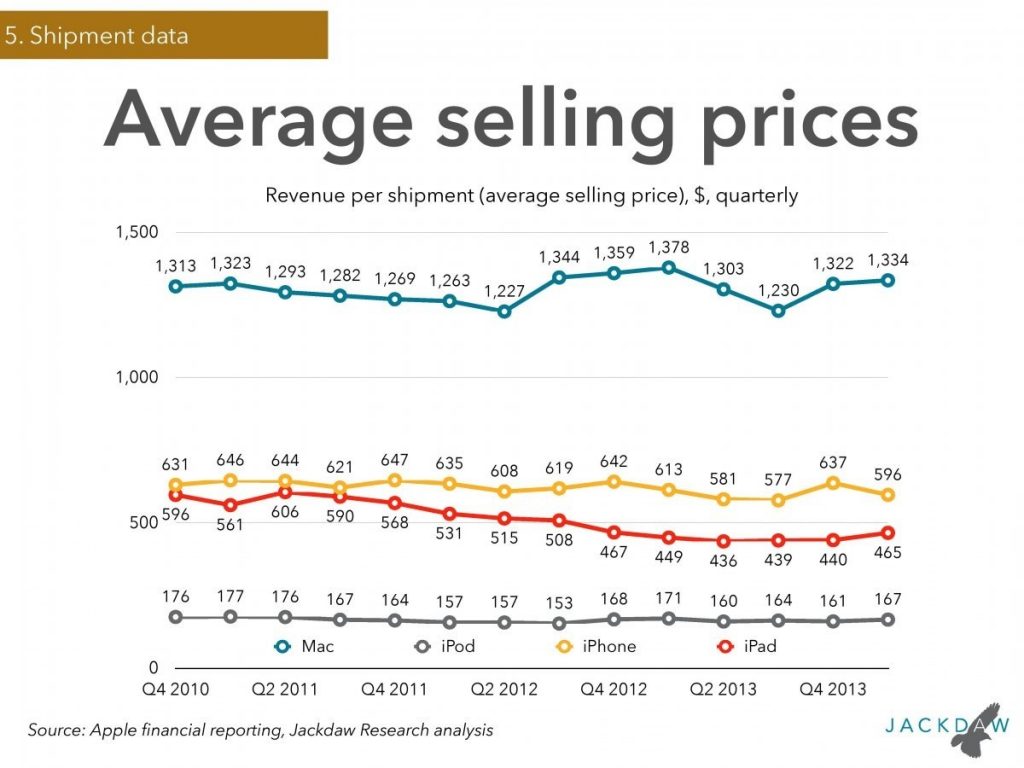
Phones and tablets are inevitably following computers into commoditization. Apple may still charge a premium for its products, but it will ultimately have to settle for a relatively small market share as a result, just as it has in computers. There is also a limit to that premium – with the likes of Google and Amazon setting the pace, the respective days of $700 smartphones and $500 tablets are numbered. ~ Peter Nowak, MacLeans.ca, 28 January 2013
You only find out who is swimming naked when the tide goes out. ~ Warren Buffett
The strong inference from Qualcomm’s earnings report is that smartphone prices are falling so fast that the new low end Apple iPhone is not likely to be competitive. ~ Nigam Arora, Contributor, Forbes, 25 April 2013
Margins
Apple has done all right when it comes to maintaining high margins. The critics insist that Apple is doing it all wrong.
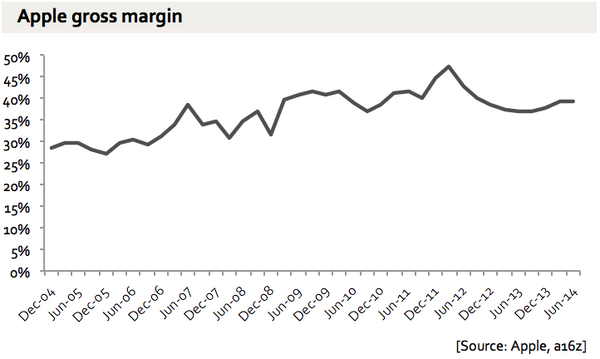
The whole sector is priced as if the average player would sustain 25 per cent margin in eternity. It’s bordering on absurdity. This will end in tears. ~ Per Lindberg, MF Global Ltd, Feb 2009
Competition is compressing Apple’s margins. ~ Glen Bradford, Seeking Alpha, 10 July 2011
Apple is focused on defending the high end of the market, and that is becoming harder to do each year. Competitors, such as the Galaxy from Samsung, are starting to catch up. I think it is inevitable that the margin pressure increases. ~ Mark Newman, Director of Mobile Research, Informa Telecoms and Media, 26 Feb 2012
It shows (data chart from Nomura Holdings) that there is no historical precedence for Apple’s gross margins. Check this out. It shows gross margins for Nokia, RIM and Apple over the past ten years and it comes to us from Nomura because it believes the iPhone’s margins are likely 10% above the sustainable levels. ~ Sara Eisen Bloomberg, 15 Oct 2012
Margins are shrinking. ~ Howard Gold, MarketWatch, 1 February 2013
In closing, the price cuts for the iPhone 5c and the shuffling of the iPad lineup do little to address the company’s core problems of its dwindling market share, slower growth, and contracting margins. ~ Leo Sun, Motley Fool, 19 March 2014
Premium
Overheard in 2001: “Who would pay $399 for an Apple music player?!?” ~ kirkburgess (@kirkburgess)
Apple has done all right when it comes to charging a premium price for their products. The critics insist that Apple is doing it all wrong.
In Q2, Apple made 68% of mobile device OEMs’ profits (65% in q1, 53% in Q2 13). Samsung – 40% (41% q1, 49% q2 13) Source: Canaccord Genuity ~ Daisuke Wakabayashi (@daiwaka) 8/5/14
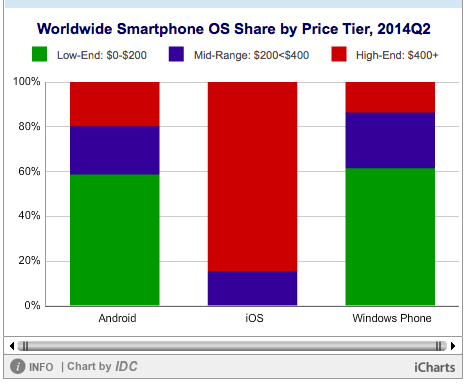
The market is already saturated with popular [phones] that are virtually free to consumers. The perceived zero cost of a cellphone like the Motorola RAZR is a serious impediment. ~ Ashok Kumar, Capital Group, 30 July 2007
Free things cost too much. ~ Talleyrand
Bleier believes Apple will have to dramatically lower iPhone prices or risk losing market share to Android-based phones and/or RIM’s Bold, which he believes will be a big hit this holiday season. ~ Scott Bleier, CreateCapital.com, 24 Oct 2008
Pricing to gain market share simply for the sake of market share is a chump’s game. ~ Bill Shamblin
Who’s going to buy an Apple iPad? Well, not you or me, anyway – not this version, not at $600-800. ~ Bruce Beris, bruceb consulting, 4 February 2010
It’s far better to buy a wonderful product at a fair price than a fair product at a wonderful price. ~ paraphrasing Warren Buffett
Americans now are buying more Android phones than iPhones. If that trend continues, analysts say that in little more than a year, Android will have erased the iPhone’s once enormous lead in the high end of the smartphone market. ~ Miguel Helft, New York Times, 17 October 2010
iPhone owns the US market. ~ Benedict Evans (@BenedictEvans) 7/22/14
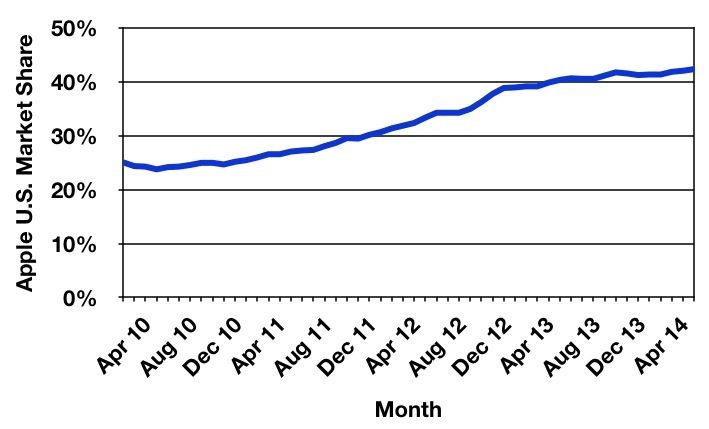
From July 2012 to July 2014, iPhone share in the U.S. went from 32.4% to 42.4%.
Problematically, the Android competition is just as expensive as the iPad lineup, so Apple obviously feels free to continue gouging consumers on iPad pricing. ~ Paul Thurrott, Windows IT Pro, 3 March 2011
Everything is worth what its purchaser will pay for it. ~ Publilius Syrus
If an exchange between two parties is voluntary, it will not take place unless both believe they will benefit from it. ~ Milton And Rose Friedman
No one had a product that could generate that kind of excitement until HP sparked a frenzy when pulled the plug on its poor-selling TouchPad and slashed the price to $99. It’s an ugly way to go, but sacrificing profits might be the quickest way to rack up big revenues, and blunt Apple’s momentum. ~ Brian Caulfield, Forbes, 30 Aug 2011
There is hardly anything in the world that some man can’t make a little worse and sell a little cheaper, and the people who consider price only are this man’s lawful prey. ~ John Ruskin
Amazon’s willingness to sell hardware at a loss combined with the strength of its brand, content, cloud infrastructure, and commerce assets makes it the only credible iPad competitor in the market. ~ Sarah Rotman Epps, Forrester, 29 Aug 2011
Apple is expected to introduce an ‘iPad Mini; next week, which will compete directly with the Kindle and Nexus, but it seems unlikely that this device will sell well if it is priced at, say, $299. ~ Henry Blodget, Business Insider, 7 Sep 2012
Price – Expensive piece of kit [iPhone 5] ~ Oliver Wolf, Greenwich Consulting, 10 Oct 2012
What is a cynic? A man who knows the price of everything and the value of nothing. ~ Oscar Wilde
The iPhone, with its single annual update and super premium price, has been run down from behind by a pack of rivals with segmented product ranges, 6 month product cycles and aggressive price points. ~ Paul Sagawa, Sector & Sovereign Research, 19 Nov 2012
I think they should invest more of it in the margin, in the business. Get lower-priced products out there. Stop going after just the premium piece. Get into the real growth engine of the smartphone market, which right now is Android, its low-priced phones in China and India, same thing on the tablets. ~ Henry Blodget, CNBC, 3 January 2013
Author’s Note: Apple should get into lower-priced products? Why? Because that strategy has worked out so well for Samsung? See chart, below.
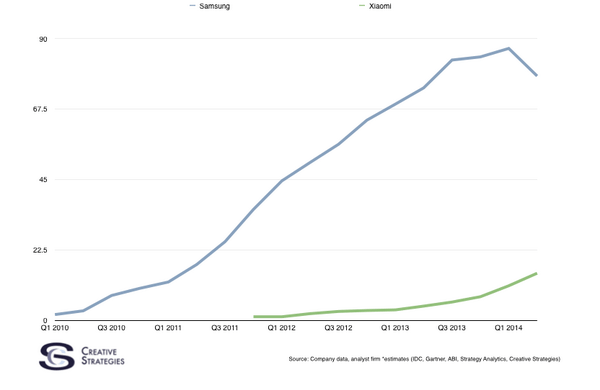
As the mobile phone market increasingly offers more quality phones at a range of price points, Apple now faces a difficult choice. Does it try to remain a premium product-premium price company, or does it dive into the commoditized lower priced arena? Neither choice is very appealing. ~ Bob Chandler, Motley Fool, 2 May 2013
Author’s Note: If being a premium business provider does not appear very appealing to you, you need to get out of the business of providing business advice.
Apple’s philosophy has always been to be consumer-centric. It wants to make easy-to-use, broadly-accessible products. But on some level, it’s failing consumers when only 18% of the global smartphone population has an iPhone. ~ Jay Yarow, Business Insider, 24 May 2013
Apple’s vision is to make the best, not the most. Apple is is the cutting edge that breaks the ice and allows others to follow. There are many fast followers (and even more slow followers). There are few pioneers. If you think that Apple is failing consumers, then you haven’t looked at the computers and notebooks and MP3 players and smartphones and tablets that consumers are using. They were all inspired by Apple.
Amazon’s pricing ambition is the clearest indication of its phone playbook: undercut rivals and grab meaningful market share. It is also shows that Apple’s worst nightmare may be coming true: prices could fall not just for cheap phones in developing markets but higher-end ones too. ~ Amir Efrati and Jessica E. Lessin, jessicalessin.com, 6 September 2013
(T)he pricing of the company’s iPad line as a whole is absurdly high, with Apple’s models often costing at least $100 more than their closest rivals. ~ Troy Wolverton, Mercury News, 24 October 2013
Apple’s new iPads and iPhones will aid the company’s revenue growth going into the busy holiday season. However, Apple’s pricing of iPhone 5c will have a difficult time competing in the lower end of the smartphone market. If Apple products remain expensive the company’s penetration rates will hit a brick wall sooner or later. ~ Ishfaque Faruk, Motley Fool , 26 October 2013

The iPhone 5c appears to be Apple’s red-headed stepchild. The tech giant is selling far fewer units of the 5c than it is of the (more expensive) 5s, according to recent reports. ~ Cadie Thompson, CNBC, 15 October 2013
Author’s Note: So Apple sells more of its premium product than its second-tier product and this is viewed as a bad thing. That reminds me of a joke:
Question: How did the fool try to kill the fish?
Answer: They tried to drown it.
Question: How did the critics try to kill Apple?
Answer: They tried to drown it in profits.
Apple in my view made a huge mistake by not launching a mid end smartphone. ~ Sneha Shah, Seeking Alpha, 2 January 2014
Wars are not won by fighting battles; wars are won by choosing battles. ~ George S. Patton
Note that the average Android price is heading toward $200 and the average iPhone price is heading toward $600. Apple is asking the question, do you want to pay three times as much for our phones? Thus far, 80% of the market has answered ‘no.’ ~ Jim Edwards, Business Insider, 31 May 2014
Twenty percent of the market has answered: “yes”.
For all that Android has improved, and we see the difference as a matter of taste, iPhone still outsells Android at the same price 3:1 ~ Benedict Evans (@BenedictEvans) ~ 3/30/14
As of June there were 886,580,000 iOS devices sold. 1 Billion sold will happen well before this year is out ~ Horace Dediu (@asymco)
Platform
Apple has the strongest computing platform in the world. The critics insist that it is an illusion that cannot last.
Over the last year, Google paid devs ~1/2 of Apple’s App Store ($5B vs $10B) on ~2x the devices @BenedictEvans
In other words, each Apple owner is worth 4 times as much to developers as is each Android owner.
Apple’s critics have always been wrong about the how Platforms work. They insist that cheaper hardware will always outsell more expensive hardware and that platform is a game of winner-take-all with the more ubiquitous hardware sales attracting the majority of the developers. You have to admire Apple’s critics for their consistency. Despite having no evidence to support their position and plenty of evidence to refute it, they’ve remained consistently wrong.
There are very roughly the same number of high-end Android and iOS users, yet total Android payout in last 12m was $5bn, where iOS was $10bn. ~ Benedict Evans (@BenedictEvans) 8/23/14
Apple will likely have a tough time convincing application vendors to build specialized clients for the iPhone until the volumes are there, and the volumes could be limited by the lack of third-party applications – a Catch 22. ~ Jack Gold, J. Gold Associates, 10 January 2007
Even if it is opened up to third parties, it is difficult to see how the installed base of iPhones can reach the level where it becomes a truly attractive service platform for operator and developer investment. ~ Tony Cripps, Ovum Service Manager for Mobile User Experience, 14 March 2007
Will [Android] be as elegantly executed as the iPhone? Probably not. But it won’t matter to the mobile application developer if there are eight or ten Android handsets shipped for every iPhone. Addressable market will again trump elegance. ~ Brian Prentice, Gartner, 21 September 2009
All the apps that count will be ported to every one of them (smartphone platforms). ~ Microsoft’s chief software architect, Ray Ozzie, at the Microsoft’s Professional Developers Conference, 17 November 2009
All the people (including me) who felt underwhelmed by the iPad initially might have missed its true potential. Put another way: the iPad is all about software. Forget the sleek form factor – that’s just a prerequisite. Ironically, it’s the software and services that Microsoft never ‘got’, that Apple totally does get. ~ Dan Wayne, apc mag, 12 February 2010
The iPhone vision of the mobile Internet’s future omits controversy, sex, and freedom, but includes strict limits on who can know what and who can say what. It’s a sterile Disney-fied walled garden surrounded by sharp-toothed lawyers. The people who create the apps serve at the landlord’s pleasure and fear his anger. I hate it. ~ Tim Bray, Developer Advocate, Google, Inc, 15 March 2010
(W)hile Apple’s attempt to control the ecosystem and maintain a closed platform may be good for Apple, developers want more options and customers want to fully access the overwhelming majority of web sites that use Flash. We think that customers are getting tired of being told what to think by Apple. ~ Jim Balsillie, Co-CEO, Research In Motion, 20 October 2010
Android will become the operating system (OS) of choice for developers rather than IOS within 12 months. ~ Adam Leach, Ovum, 23 Jan 2012
If Apple continues to pursue its current pricing and maximize-short-term profit strategy, it may continue to increase its profits for the next couple of years. (BlackBerry and Nokia grew earnings for a couple of years after some analysts began seeing the writing on the wall.)
But Apple will also continue to lose platform and ecosystem share in most of the world.
Apple fans can talk all they want about how Apple is “like BMW,” but in a couple of key competitive respects, it isn’t. And if the gadget platform market behaves the way other platform markets have (think Windows), Apple and its fans may come to regret this short-term thinking in the end. ~ Henry Blodget, Business Insider, 15 November 2013
Author’s Note: Hardware is the musical instrument. Software is the musical score. Platform is the stage. Ecosystem is the Orchestra that brings the instruments, the music and the players altogether on the grand stage. There is no company on the planet who out orchestrates or out ecosystems Apple.
Until such time as the critics understand that the Orchestral performance — the overall ecosystem — is worth far more than its component parts, they will never understand Apple.
Wall Street
October. This is one of the peculiarly dangerous months to speculate in stocks. The others are July, January, September, April, November, May, March, June, December, August and February. ~ Mark Twain
Just before, during, and after the upcoming Apple Event, Apple stock is going to take a dramatic turn. And you know what that means about the future of Apple’s current products and about the future of Apple…
…absolutely nothing.
Believing that the direction of Apple stock determines the value of an Apple Event is like believing that a weathervane controls the direction of the wind. ~ John R. Kirk
The stock market is neither a gauge of current success nor a predictor of future success.
Markets reflect perception. In that sense they are always right. For the price to change, perception has to change. ~ Horace Dediu (@asymco)
In the short run, the market is a voting machine but in the long run, it is a weighing machine. ~ Benjamin Graham
We think that markets reflect and even anticipate facts. But markets reflect perception, not facts. And perception is not about reality, it’s about human foibles.
If a business does well, the stock eventually follows. ~ Warren Buffett
Claim Chowder
iPhone which doesn’t look, I mean to me… And I guess some of these stocks went down on the Apple announcement, thinking that Apple could do no wrong, but I think Apple can do wrong and I think this is it. ~ John C. Dvorak, 13 January 2007
The best revenge is massive success. ~ Frank Sinatra
Sell your Apple stock now, while the hype’s still hot. You heard it here first. ~ David S. Platt, Suckbusters!, 21 June 2007
I made a killing in the stock market. My broker lost all my money, so I killed him. ~ Jim Loy
(W)e think investors should also pay close attention to Apple. In addition to the Amazon tablet, Apple faces a growing number of risks. ~ Naked Value, 27 Sept 2011
Cook has been increasingly compared to Jobs and found wanting. ~ Rob Enderle, TechNewsWorld, 26 March 2012
I was talking recently to someone who knew Apple well, and I asked him if the people now running the company would be able to keep creating new things the way Apple had under Steve Jobs. His answer was simply ‘no.’ I already feared that would be the answer. I asked more to see how he’d qualify it. But he didn’t qualify it at all. No, there will be no more great new stuff beyond whatever’s currently in the pipeline. So if Apple’s not going to make the next iPad, who is? ~ Paul Graham, March 2012
Market share analysis presumes a zero sum game but greatest wealth comes from creation of new markets. ~ Horace Dediu (@asymco)
Here are seven events, all of which could hurt Apple’s stock price in a big way:
1. Wireless service providers (WSPs) collectively decrease iPhone subsidy
2. Window 8 is a huge success
3. No surprise in iPhone 5
4. Departure of major executives
5. Lukewarm replacement sales
6. Global smartphone growth slows down
7. Chinese demand of iPhone unsustainable during the last quarter
Gutone, Seeking Alpha, 29 May 2012
Here are four reasons why I don’t think Apple’s stock will see $700 again:
1. Growth in phones is slowing as competition increases
2. Margins are shrinking
3. Apple is losing its innovative edge
4. Apple may no longer be a growth story”
Howard Gold, MarketWatch, 1 February 2013
Author’s Note: Apple’s stock adjusted price passed $700 in August, 2014.
As a value investor, I strongly believe in BlackBerry’s future because the company has several advantages, such as the security, the Q10 and the corporate world. On the contrary, Apple’s potential increase appears very limited in the short run because the company won’t release new products, which can increase the interest of the company. ~ Gillian Mauyen, Seeking Alpha, 28 April 2013
Harvard University, the world’s wealthiest university, has liquidated its stake in Apple Inc. as the iPhone maker’s shares tumbled after reaching a record high of $702.10 in September. ~ Michael McDonald, Bloomberg, 10 May 2013
Author’s Note: One doesn’t have to go to Harvard to know that it’s “Buy low, sell high.” Instead, most investors — including large institutional investors — are inclined to buy stock on the way up and sell it on the way down.
Apple has become a value trap, This is a company with no growth, and profit margins that are way too high vis a vis the competition. ~ Doug Kass, Seabreeze Partners Management, 17 Sept 2013
I will look at taking my profits on Apple stock as I do not think that the company has much upside left at the current valuation and price. ~ Sneha Shah, Seeking Alpha, 25 October 2013
They only have 60 days left to either come up with something or they will disappear,” said Trip Chowdhry, managing director at Global Equities Research. (March, 2014)
Wasn’t Apple supposed to have disappeared by now without the iWatch? ~ Brad Reed (@bwreedbgr) 8/20/14
—

We simply attempt to be fearful when others are greedy and to be greedy only when others are fearful. ~ Warren Buffett
Lessons Learned And Unlearned
When I find the road narrow, and can see no other way of teaching a well-established truth except by pleasing one intelligent man and displeasing ten thousand fools — I prefer to address myself to the one man. ~ Maimonides
This has been a very long article and this has been a very long series of articles. Have we learned anything from it? I fear we haven’t learned much. As this week progressed, I watched pundit after pundit make the same ridiculous errors that they’ve always made and, I guess, that they always will make. But just because they will never learn does not mean that we cannot profit from their mistakes.
Wise men profit more from fools than fools from wise men; for the wise men shun the mistakes of fools, but fools do not imitate the successes of the wise. ~ Cato the Elder
Here then are seven last lessons learned and unlearned.
Butcher
Don’t take a butcher’s advice on how to cook meat. If he knew, he’d be a chef. ~ Andy Rooney
Apple is one of the greatest Chef’s of our age. Most critics are butchers. Enough said.
Swimmingly
Never offer to teach a fish to swim. ~ Proverbs
Apple seems to be doing swimmingly without our advice. Perhaps we should stop spending our time telling them what they’re doing wrong and start learning what they’re doing right.
There are a lot of people innovating, and that’s not the main distinction of my career. The reason Apple resonates with people is that there’s a deep current of humanity in our innovation. ~ Steve Jobs
Cannot
The person who says it cannot be done should not interrupt the person who is doing it. ~ Chinese Proverb
Don’t listen to people who say it can’t be done. ~ Steve Jobs
If something is being done, we should stop saying that it cannot be done and start figuring out how they’re doing it.
Things are only impossible until they’re not. ~ Jean-Luc Picard
Prophets
“Apple is screwed” – 1997, 1998, 1999, 2000, 2001, 2002, 2003, 2004, 2005, 2006, 2007, 2008, 2009, 2010, 2011, 2012, 2013, 2014. ~ Sammy the Walrus IV (@SammyWalrusIV)
It is a test of true theories not only to account for but to predict phenomena. ~ William Whewell
To arrive at a contradiction is to confess an error in one’s thinking; to maintain a contradiction is to abdicate one’s mind and to evict oneself from the realm of reality. ~ Ayn Rand
The prophets of doom have predicted Apple’s demise year in and year out and always they have been wrong. We need to pay less attention to prophets and more attention to profits.
Unconventional
Worldly wisdom teaches that it is better for reputation to fail conventionally than to succeed unconventionally. ~ John Maynard Keynes
It is a paradoxical truism that success comes from unconventional strategies which are, by definition unpopular.
Differentiated
It’s not about doing what you can, it’s about doing what others can’t. ((Excerpt From: C. Michel. “Life Quotes.” C. Michel, 2012. iBooks. https://itun.es/us/AyIDI.l))
Apple’s critics always want Apple to adopt the strategies employed by their competitors. This, of course, makes no sense at all. The goal is to be different from, and more successful than, one’s competitors.
Apple has no competition who sell what their customers are buying. ~ Horace Dediu (@asymco) (3/18/14)
Apple has a monopoly on being Apple. They want to maintain that for just as long as they can.
Long Run
It may not be that the race is not always to the swift, nor the battle to the strong – but that is the way to bet. ~ Damon Runyon
Apple is in it for the long run. We too should viewing Apple from a long-term perspective.
Apple is run ‘for the investors who are going to stay, not the ones who are going to leave.’ ~ Warren Buffett
When you get up in the morning and the press is selling Apple short, go out and buy some shares. That’s what I would do. That’s what I have done. ~ Steve Jobs
If you’re in Apple for only a week… or two months, I would encourage you not to invest in Apple. We are here for the long term. ~ Tim Cook
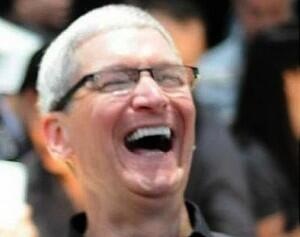
CAPTION: Tim Cook and Apple crying all the way to the bank.
Apple Claim Chowder Series:
Introduction
Events
Killers
Cynicism
Product
Evolutionary Or Revolutionary
Business Models

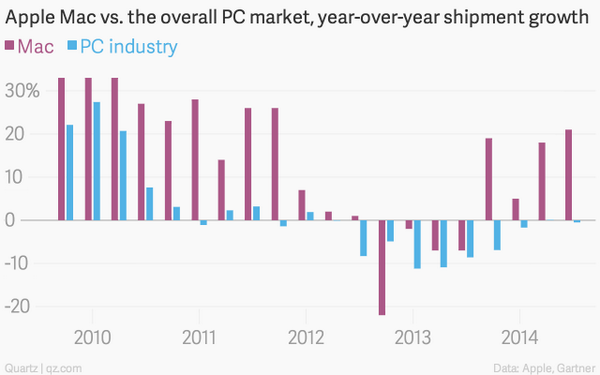

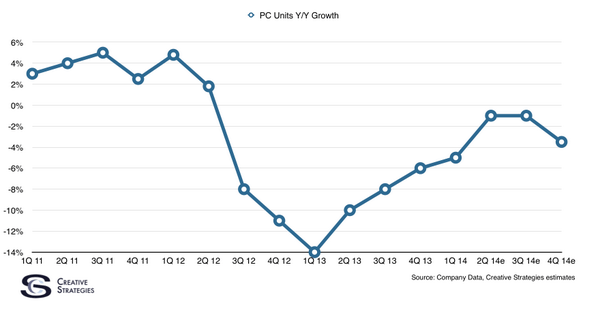
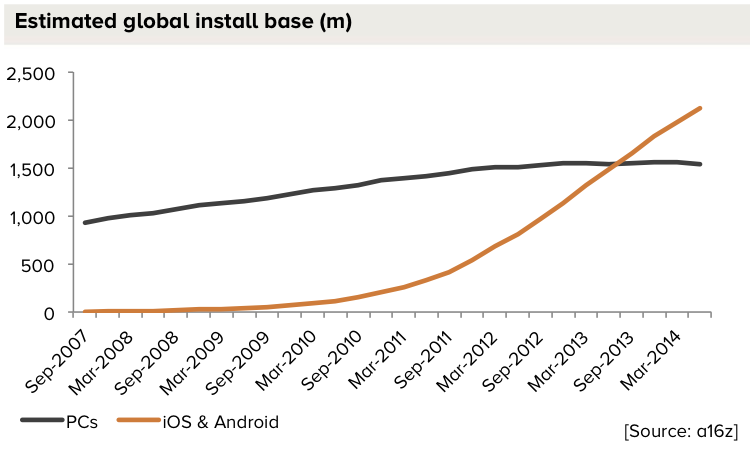

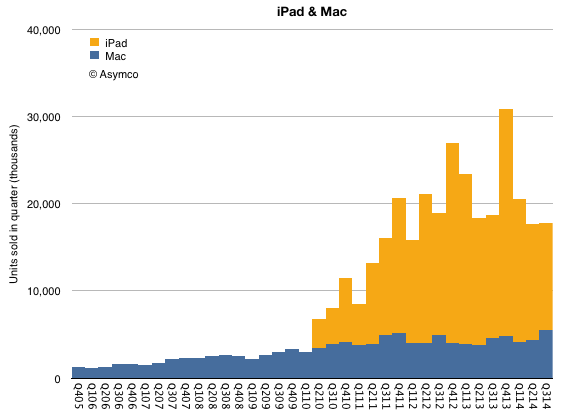
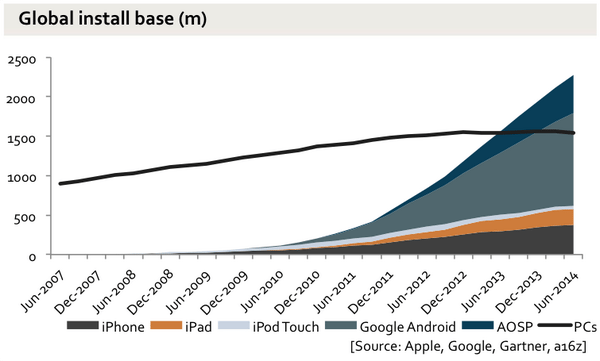
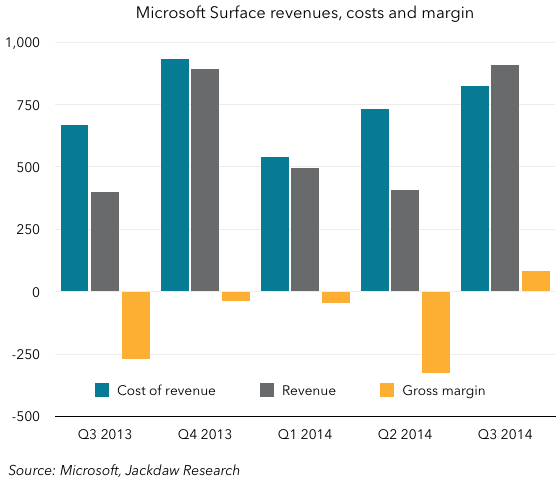


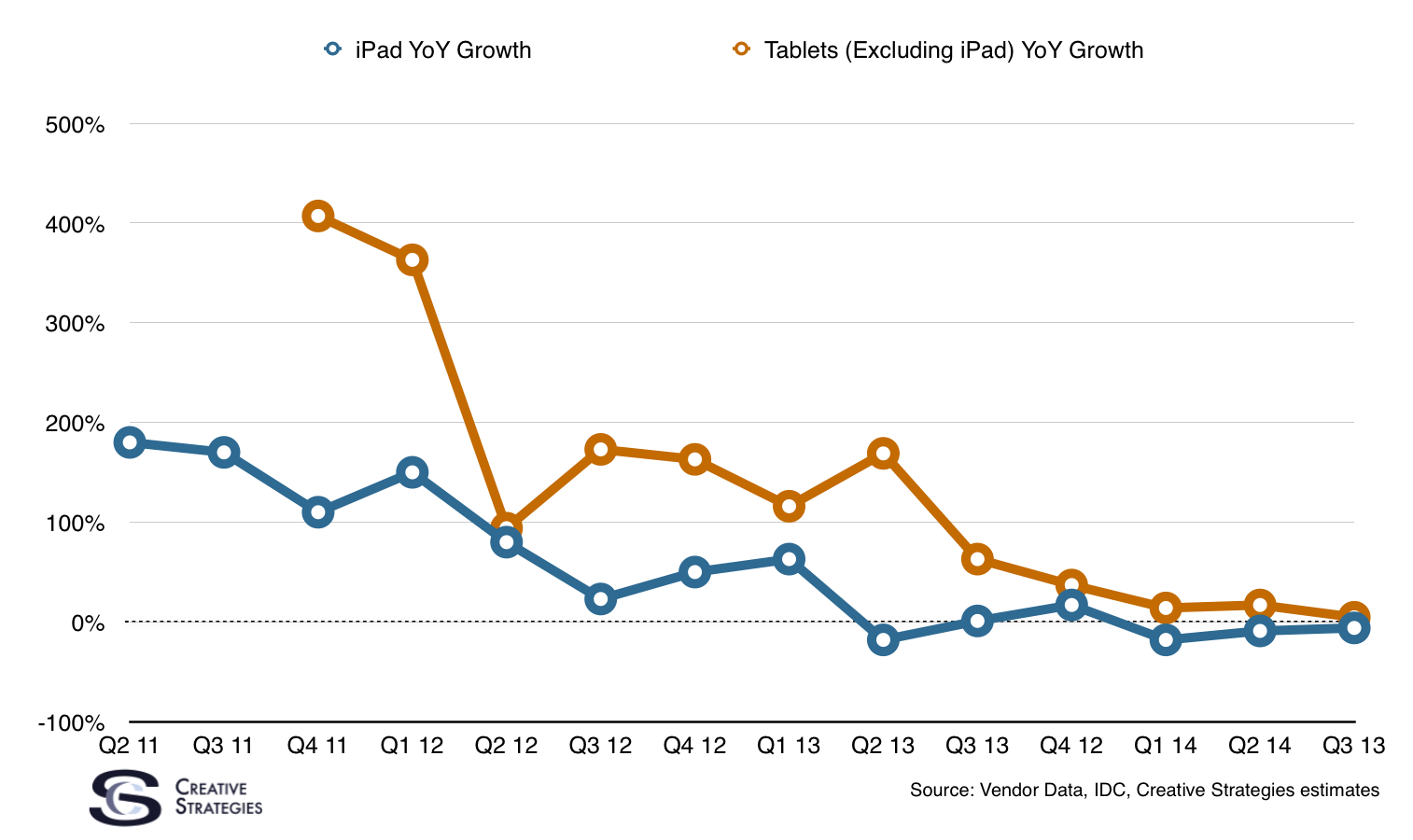














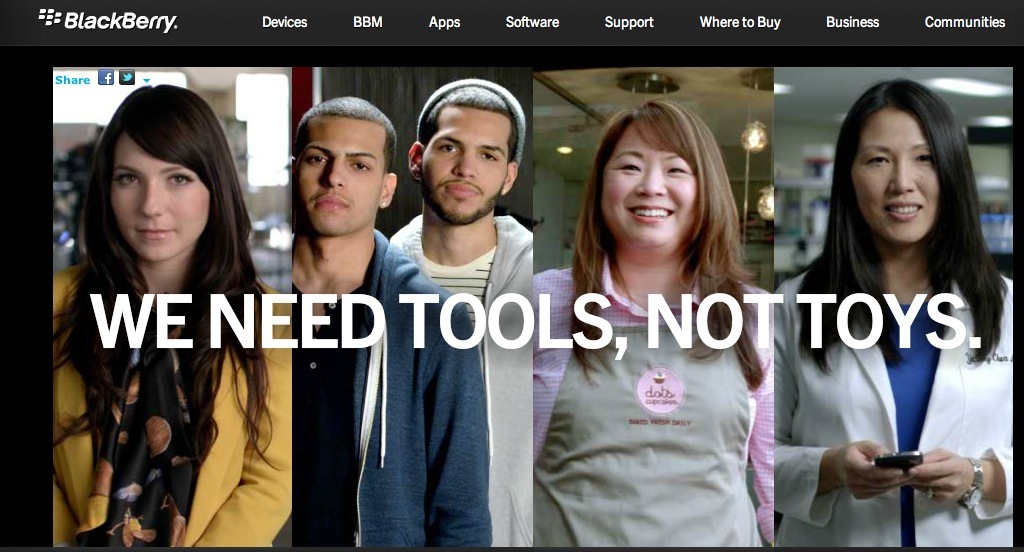





 But when it comes right down to it, the BlackBerry Storm will be the superior mobile device and represents a true iPhone killer. ~
But when it comes right down to it, the BlackBerry Storm will be the superior mobile device and represents a true iPhone killer. ~  Microsoft workers celebrated the release to manufacturing of Windows Phone 7 last week by parading through their Redmond campus with iPhone and BlackBerry hearses. ~
Microsoft workers celebrated the release to manufacturing of Windows Phone 7 last week by parading through their Redmond campus with iPhone and BlackBerry hearses. ~ 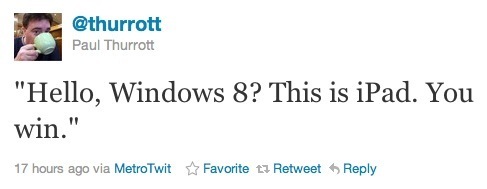

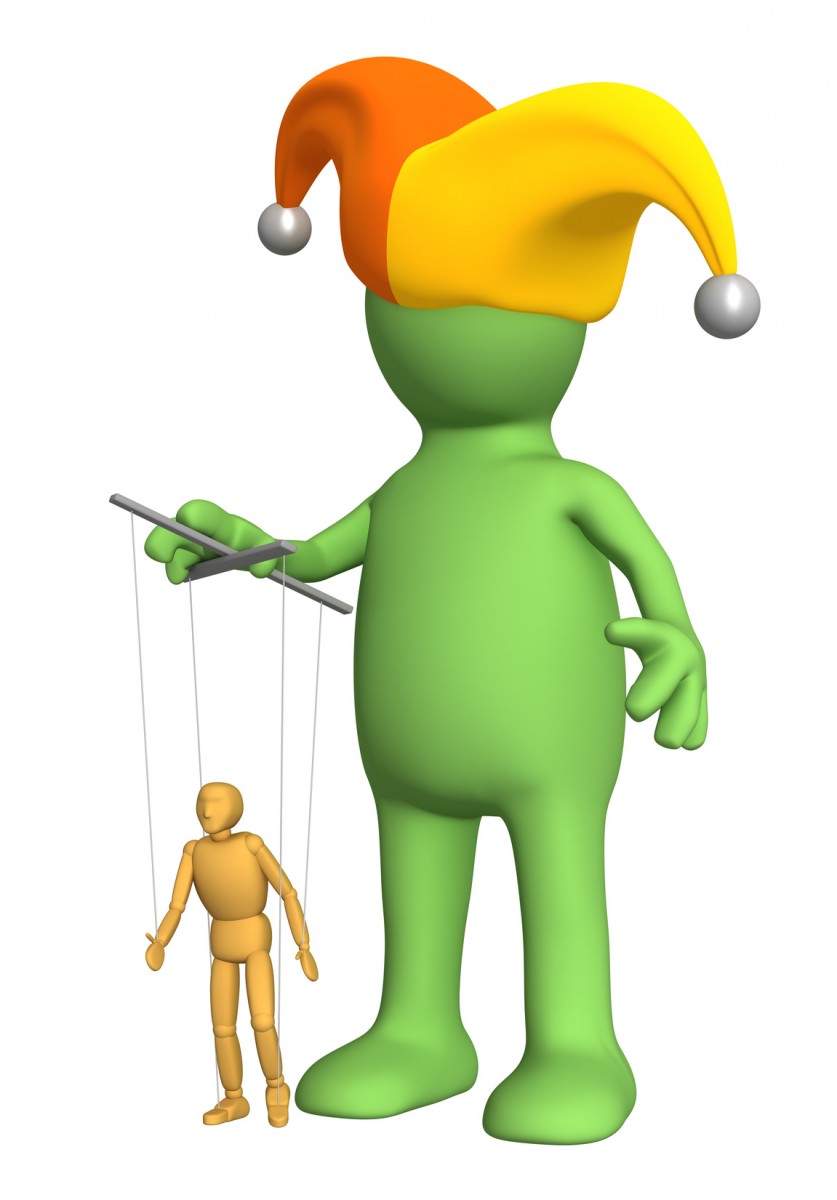
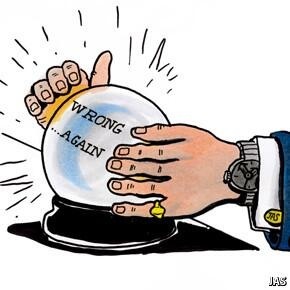 Apple will launch a mobile phone in January, and it will become available during 2007. … After a year a new version will be launched, but it will lack the innovation of the first and quickly vanish. The only question remaining is if, when the iPod phone fails, it will take the iPod with it. ~ Bill Ray, The Register, 26 December 2006
Apple will launch a mobile phone in January, and it will become available during 2007. … After a year a new version will be launched, but it will lack the innovation of the first and quickly vanish. The only question remaining is if, when the iPod phone fails, it will take the iPod with it. ~ Bill Ray, The Register, 26 December 2006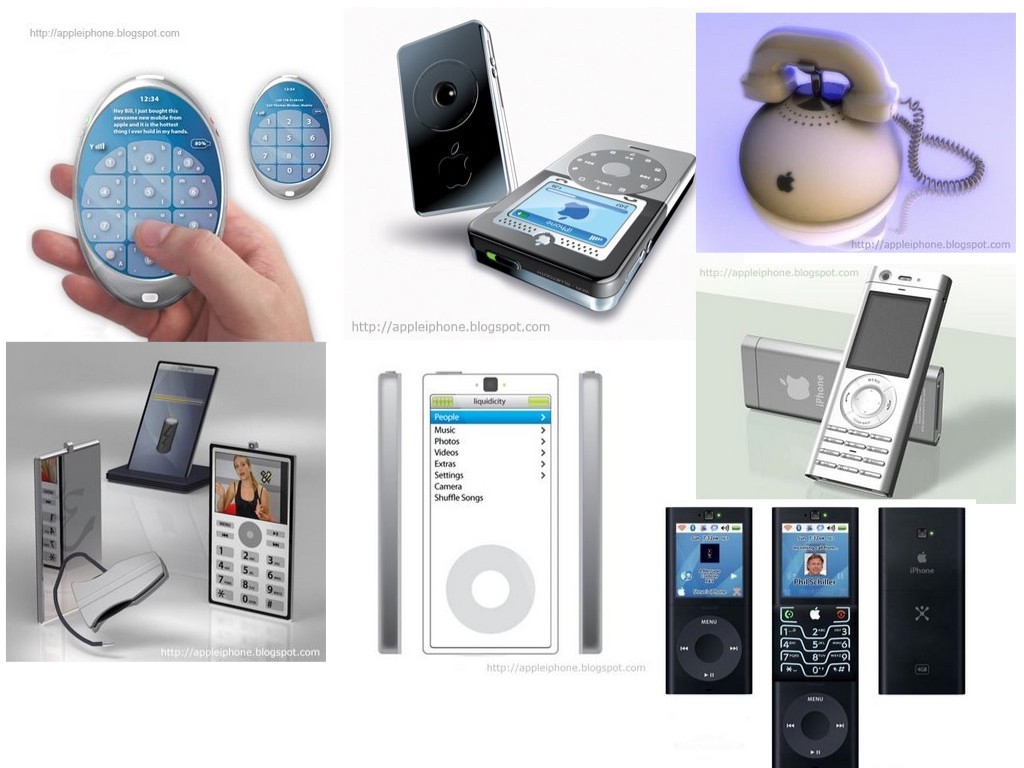



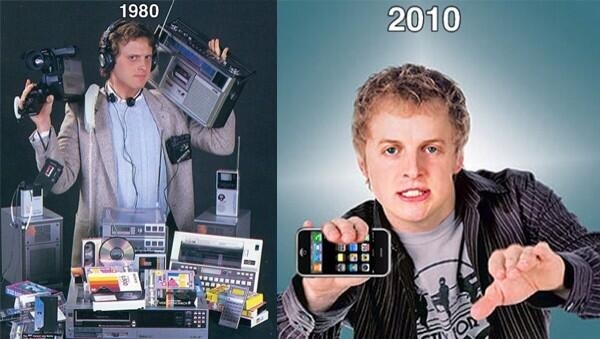
 $500 fully subsidized with a plan! I said that is the most expensive phone in the world and it doesn’t appeal to business customers because it doesn’t have a keyboard, which makes it not a very good email machine. ~
$500 fully subsidized with a plan! I said that is the most expensive phone in the world and it doesn’t appeal to business customers because it doesn’t have a keyboard, which makes it not a very good email machine. ~ 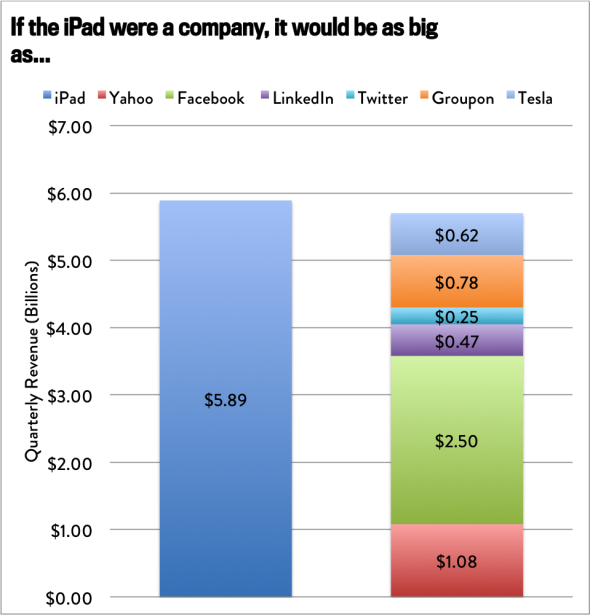

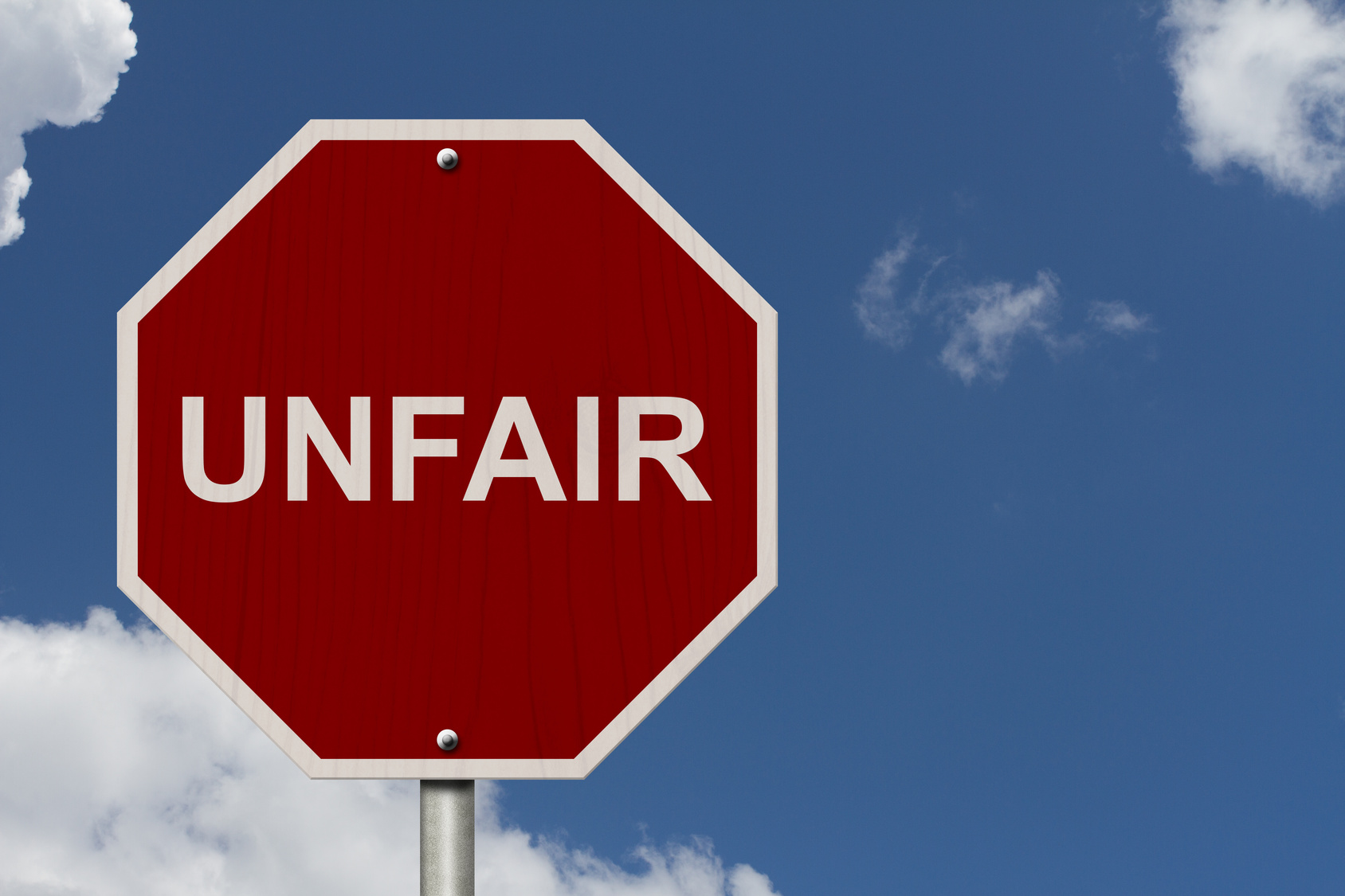
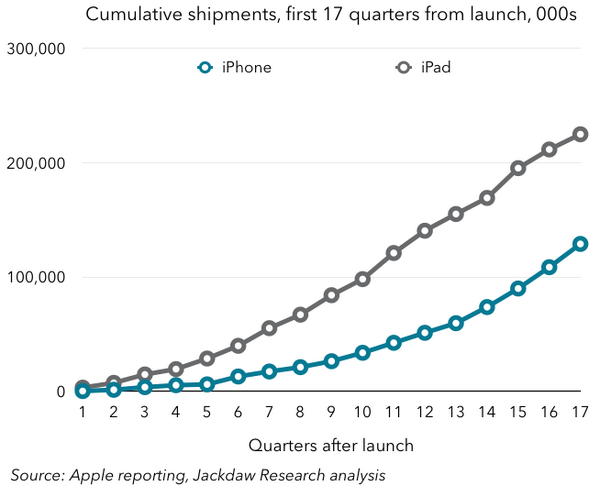
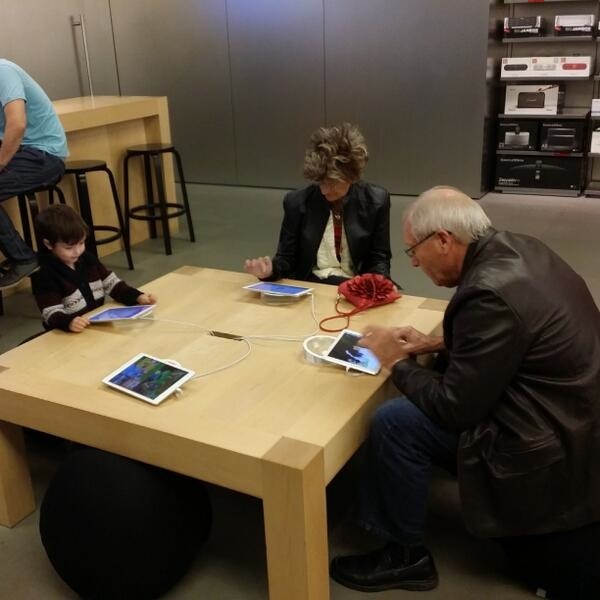
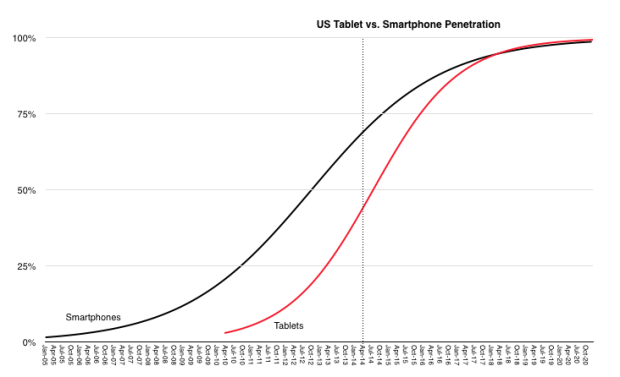

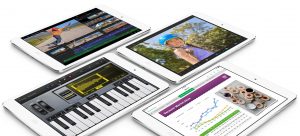


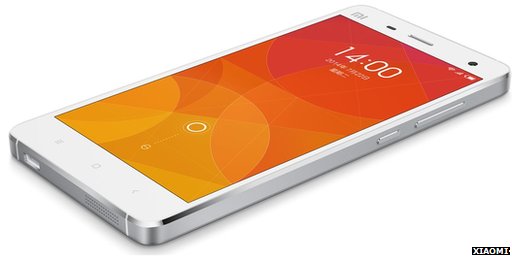

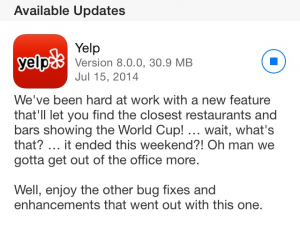
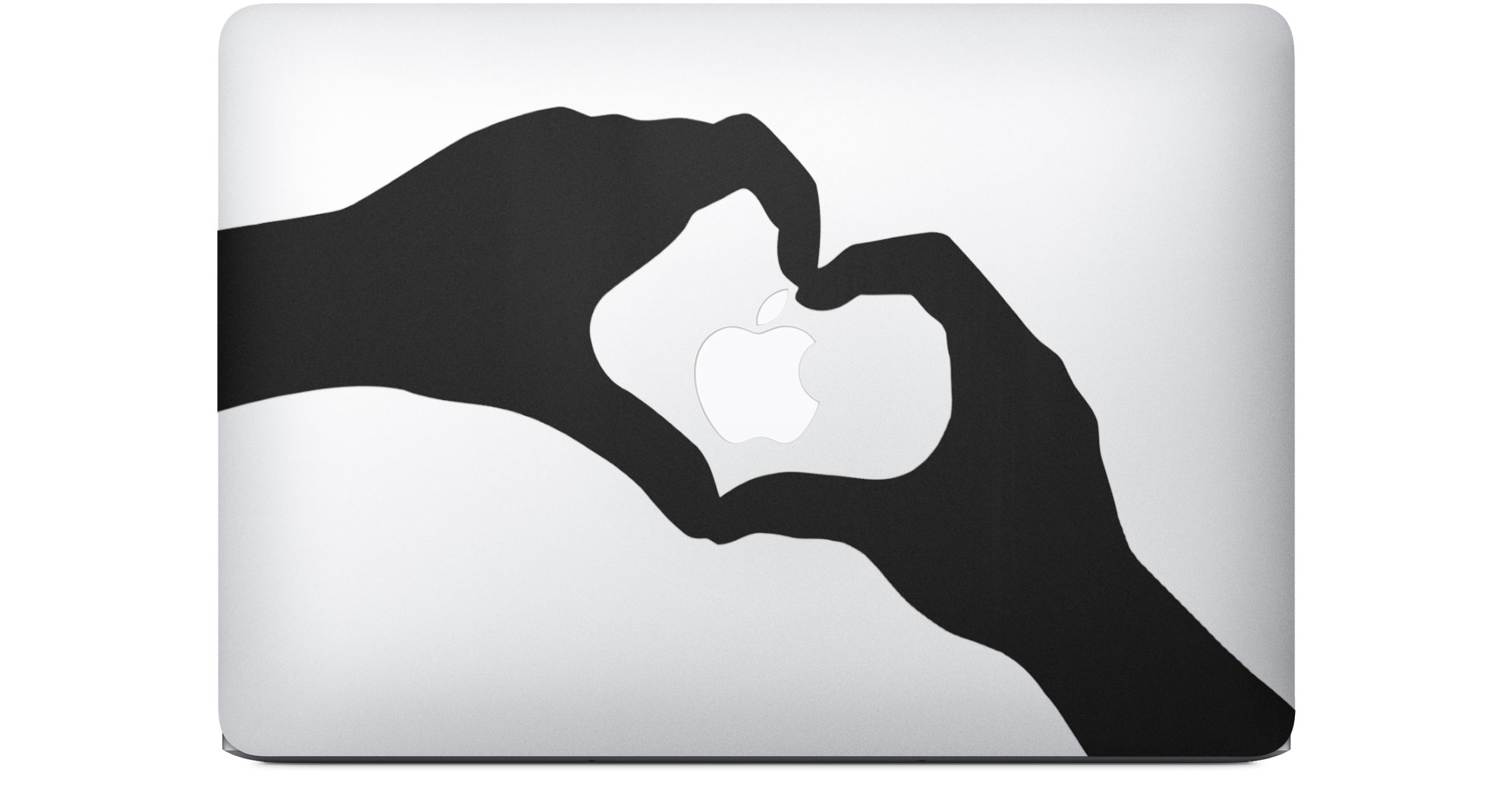
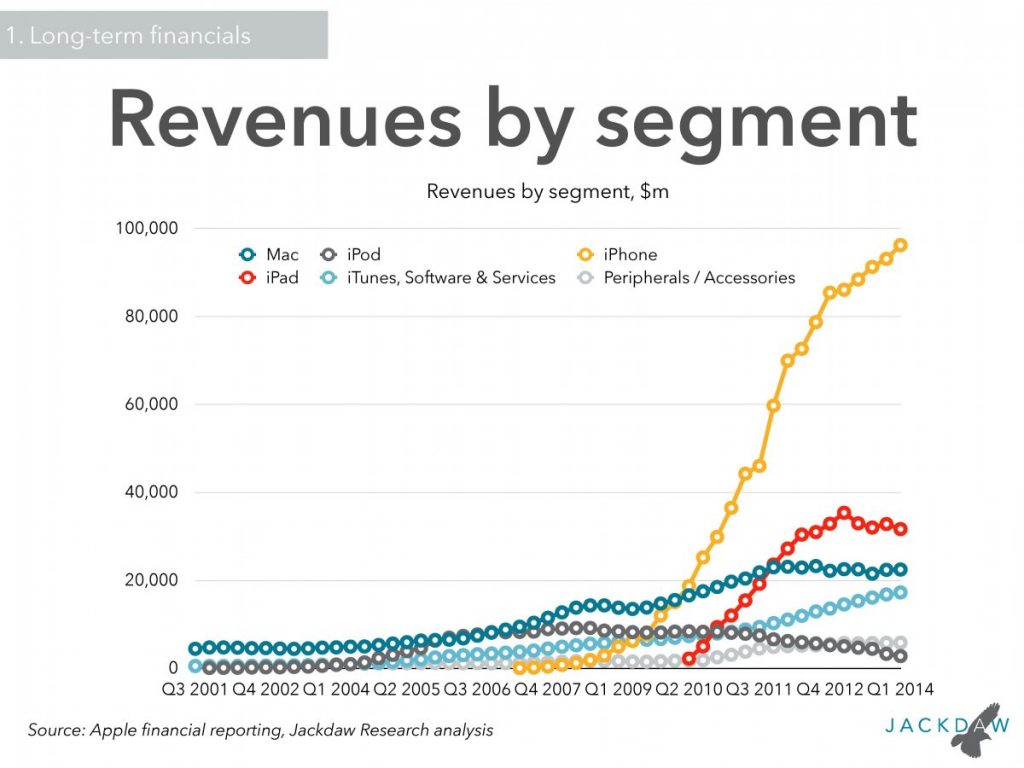
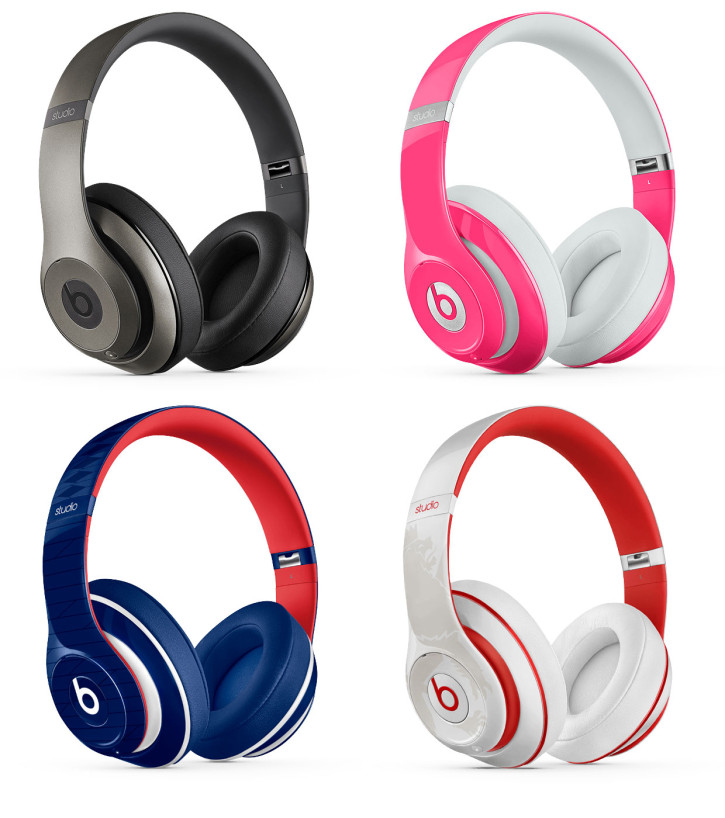



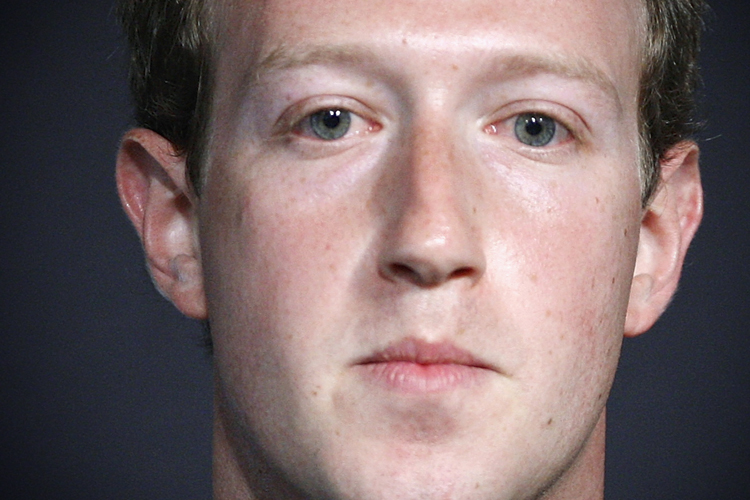


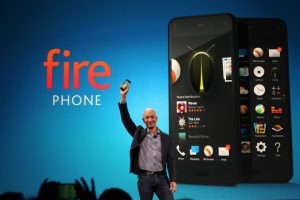


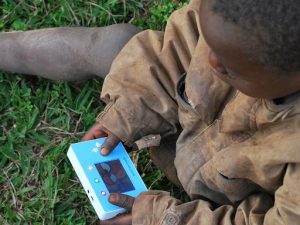




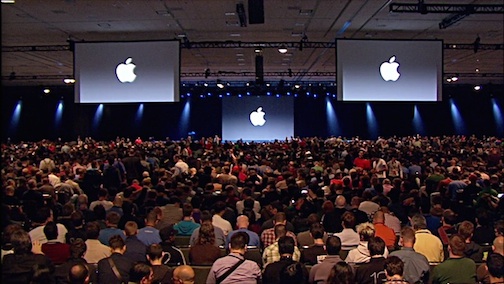


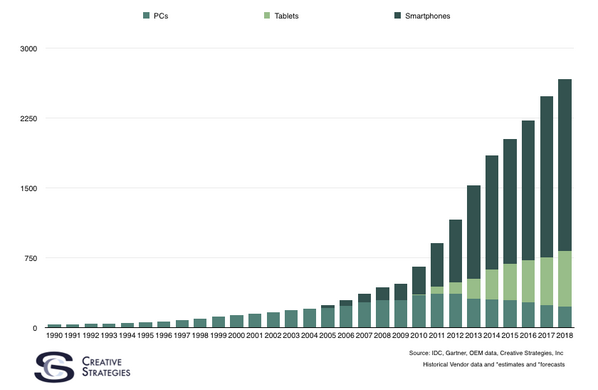
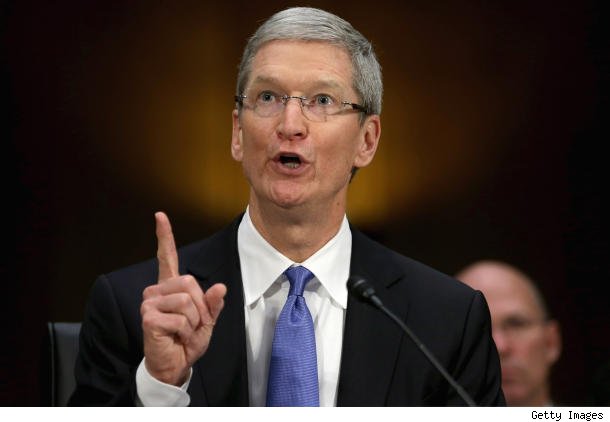

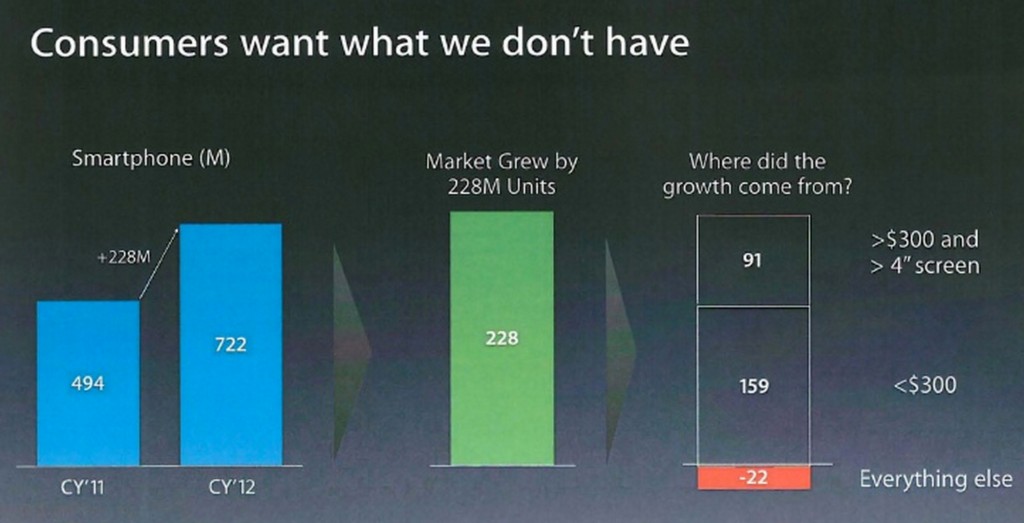
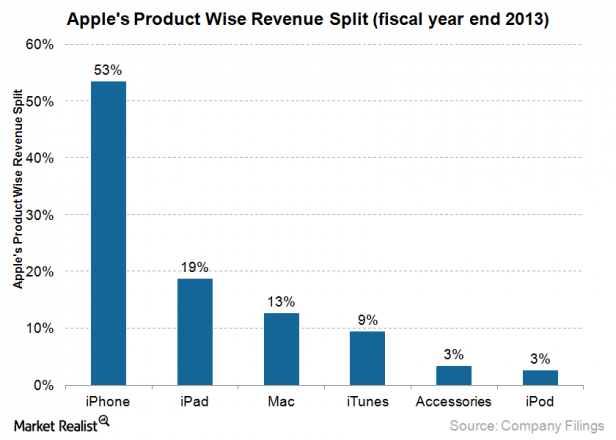

 Microsoft claiming their tablets are equipped with the full PC experience is like a hooker claiming she is equipped with a chastity belt. It’s neither a feature nor a benefit.
Microsoft claiming their tablets are equipped with the full PC experience is like a hooker claiming she is equipped with a chastity belt. It’s neither a feature nor a benefit.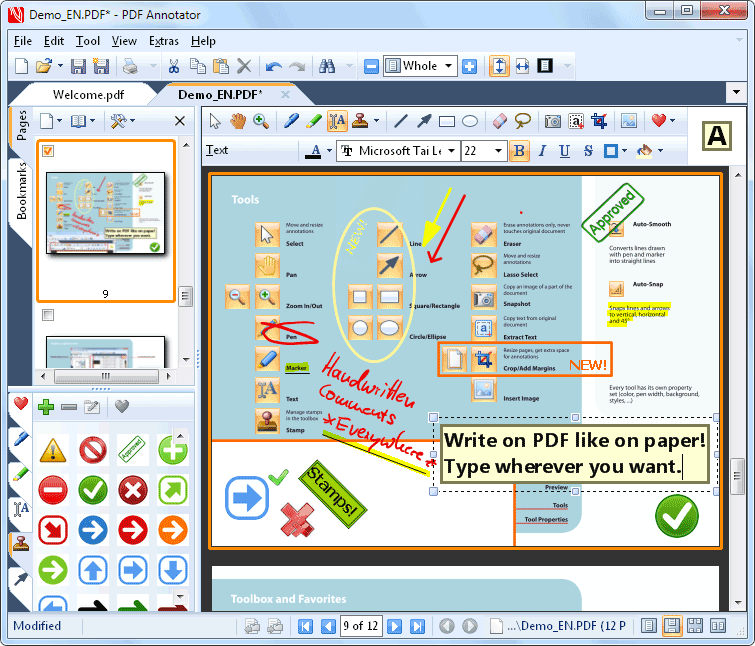
 I suspect if Microsoft had been in the bicycle business at the turn of the last century, they would have offered “pedal skates” as their alternative to Apple’s roller skates, all the while claiming their pedal skates were “real” bicycles because they had “real” tires.
I suspect if Microsoft had been in the bicycle business at the turn of the last century, they would have offered “pedal skates” as their alternative to Apple’s roller skates, all the while claiming their pedal skates were “real” bicycles because they had “real” tires.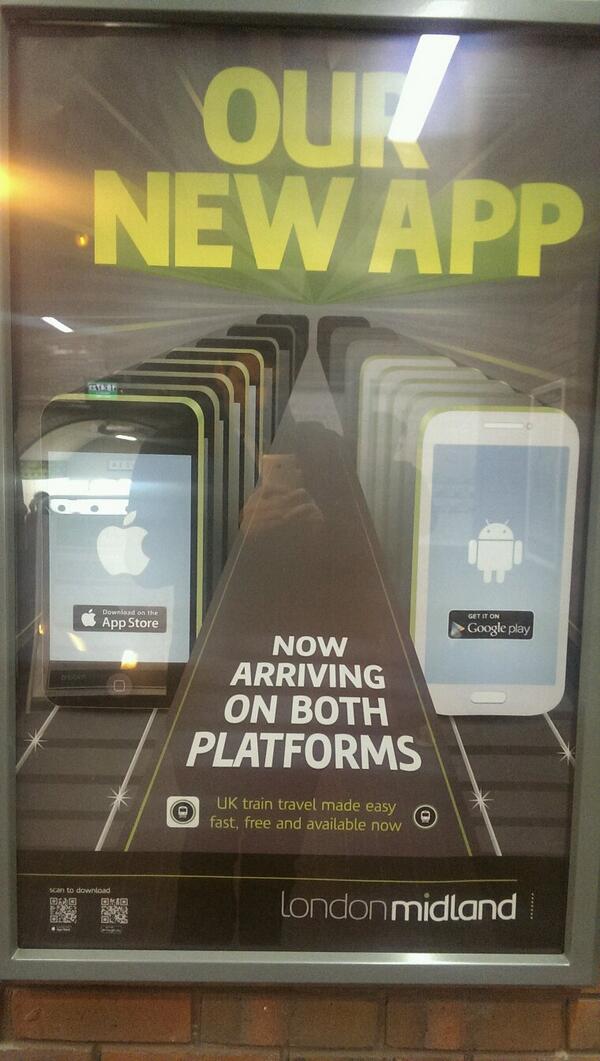




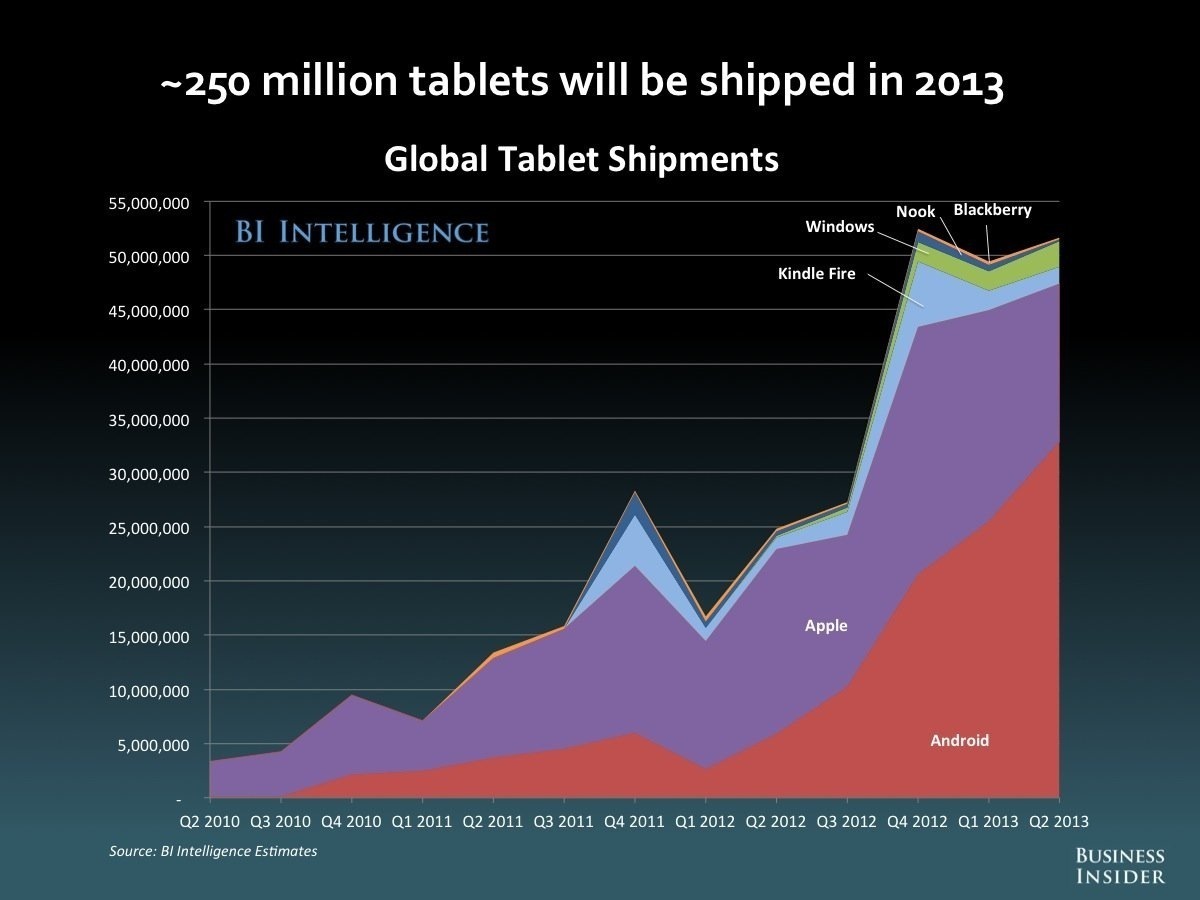
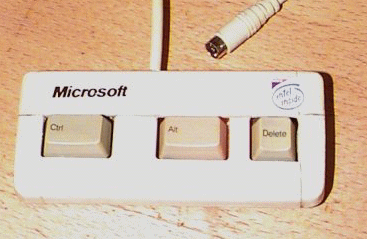 Microsoft should Control-Alt-Delete their attempts at a unified operating system, but I don’t think there’s any chance that that will happen. Based on the statements coming out of Redmond, Microsoft is doubling-down on their current strategy which, in my opinion, is a tragic mistake. Besides, asking Microsoft to fix what’s wrong with Windows 8 is like making them the detective in a crime movie where they’re also the murderer.
Microsoft should Control-Alt-Delete their attempts at a unified operating system, but I don’t think there’s any chance that that will happen. Based on the statements coming out of Redmond, Microsoft is doubling-down on their current strategy which, in my opinion, is a tragic mistake. Besides, asking Microsoft to fix what’s wrong with Windows 8 is like making them the detective in a crime movie where they’re also the murderer.






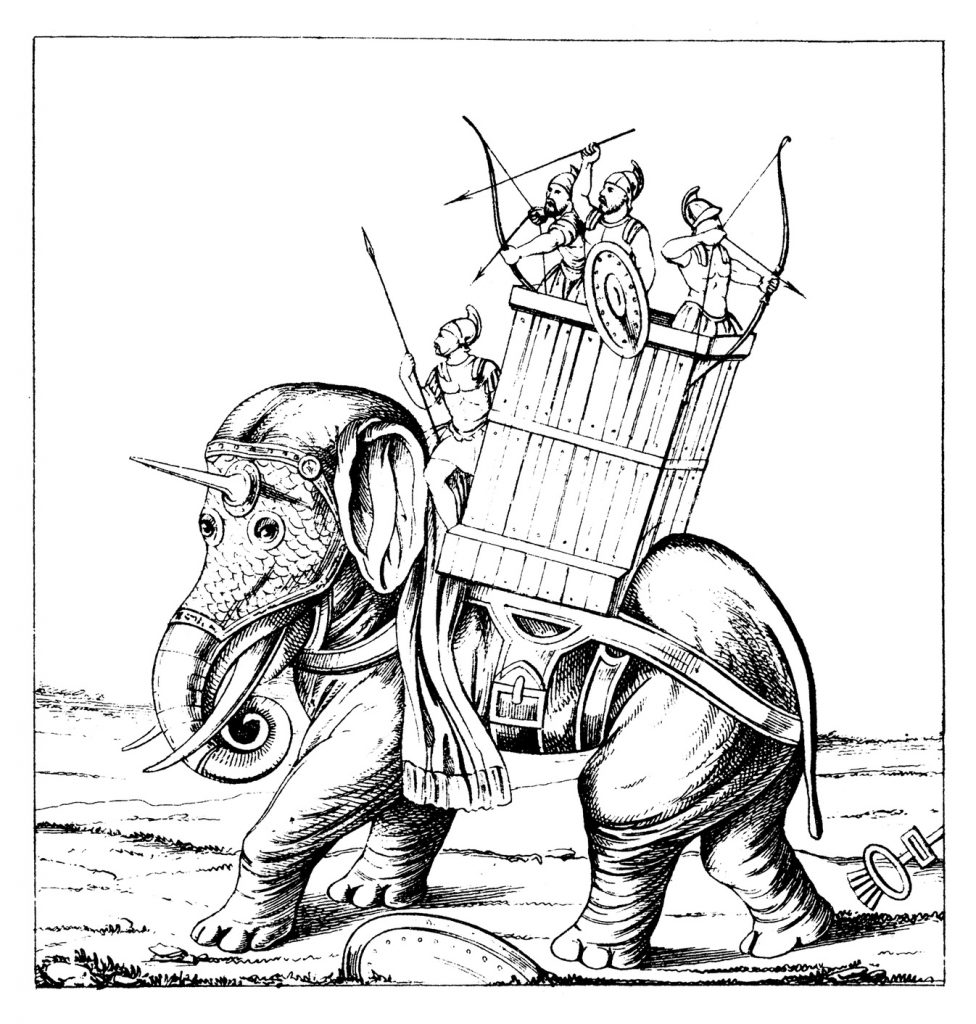

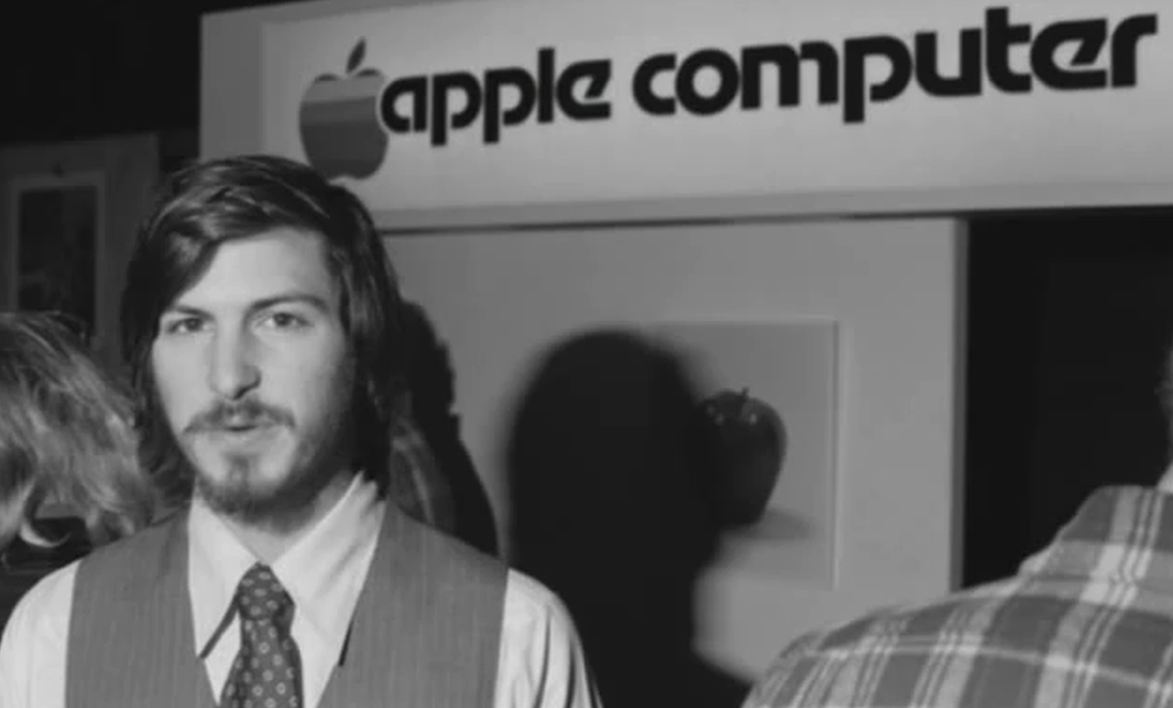
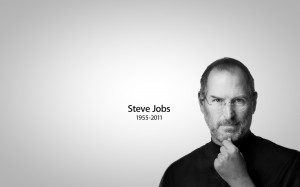 In so many ways, ways we now take for granted, ways that Google and Microsoft are rapidly trying to copy, it was Jobs who showed us the way — even as we all were convinced of his wrongness. Jobs proved us wrong not just on technical matters, but on profound aspects of both technology and business.
In so many ways, ways we now take for granted, ways that Google and Microsoft are rapidly trying to copy, it was Jobs who showed us the way — even as we all were convinced of his wrongness. Jobs proved us wrong not just on technical matters, but on profound aspects of both technology and business.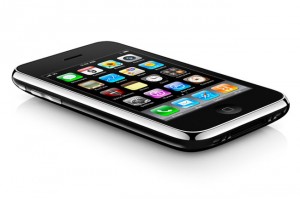

 Now what can this picture teach us?
Now what can this picture teach us?